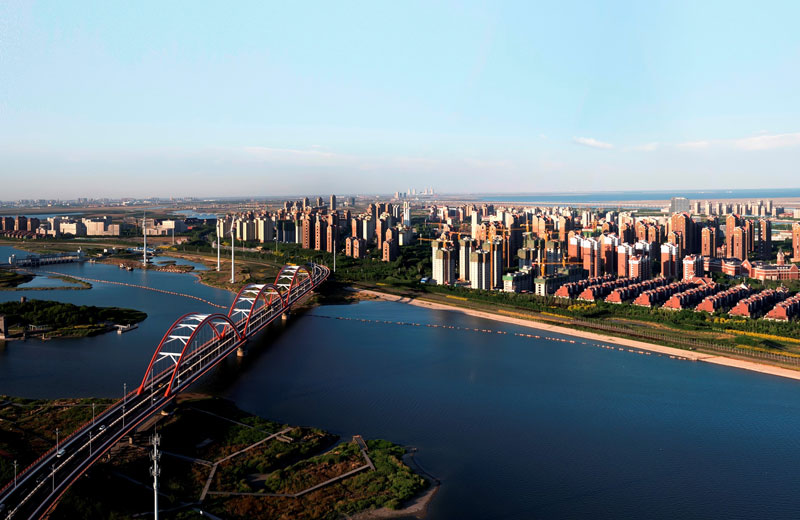
Photo Source: Sino-Singapore Tianjin Eco City
The world’s cities are getting smarter. The dual trends of steady urbanization and digitization have changed the way major cities are being governed and managed. Such trends are embodied in the concept of the “smart city,” a model of using information technology in managing ever-growing urban environments across the globe.
The Philippines definitely has intentions of following this trend. Some of the major plans for smart cities include the “City of Pearl” (407 hectares) in Manila, Clark Green City (9450 Hectares) in Tarlac, and Quezon City, with city hall announcing their plans after hosting the 2018 Smart City summit. Whether these plans can solve the problems of Philippine cities remains to be a valid debate.
At a glance, the Philippines may seem ripe for the integration of smart cities. Filipino society has indeed become significantly digitized with Filipinos comprising a huge portion of social media users around the world and one of the largest app markets in Southeast Asia. However, the Philippines also has among the slowest internet speeds in the region and among the worst urban planning in the world with regular traffic jams in major roads. Though the Philippines has a potential market demand for smart cities, the country lacks digital as well as physical infrastructure to supply the promised benefits of a smart city.
Much like the Philippines, China has a steady urbanization rate, a thriving app market and active social media presence (800 million). In contrast to the Philippines, the Chinese government managed to deploy many large scale smart city projects, numbering at around 300 plans in 2013. As of 2018, that number had jumped to 500 projects, making China the world’s leader in smart city construction.
Here are some exemplary cases of China’s smart cities:
Green Technology- China is currently building 285 smart eco-cities as a means of promoting sustainable urban living. Among the flagship projects is the Sino-Singaporean Tianjin Eco-City (SSCTEC). The project is a partnership with the Singaporean government and features a hub for green technology, green residential buildings and electronic driverless cars.
Tourism- Dunhuang city complements its scenic showcases of ancient China with smart tourism mechanisms. In cooperation with Huawei, Dunhuang City features technologies such as QR codes quick ticket booking, wireless sensors and facial recognition surveillance systems for protecting historical spots and full wi-fi coverage in high tourist traffic areas.
Transportation- Shanghai City is a leading site of "smart transportation." Shanghai, in cooperation with tech giant, Baidu, uses a "Citizen Cloud" mobile app for different government services such as driver's license information, healthcare records, and parking space locations. Another more recent example is the new fleet of artificial intelligence (AI) tour buses which features wireless multilingual tour guides.
What can the Philippines learn from China’s experience?
While not perfect, China’s experience can still provide important lessons for the Philippines in smart city development.
- Coordination between government and Tech industry- The Chinese government has close relations with its top technological corporations, namely Baidu, Tencent, and Alibaba. Though controversial, this relationship has provided the tech industry some advantages in growing prominently both in the domestic and global markets. These tech giants are directly involved in many of the smart city projects under construction. The Philippine tech industry is dominated by foreign companies and would benefit if the government would incubate domestic tech companies.
- Political prioritization- While the Duterte administration focuses on infrastructure development through his “Build,Build Build” program, it neglects the technological aspect of smart cities. During his address at the 19th People’s Congress, President Xi Jinping included the construction of a smart society as a new means of development. His flagship megaproject embodying the smart city model in a large scale is Xiongan, an underdeveloped area near Beijing.
- Government control of land economy- Even after China’s long period of reform and “opening up,” the urban land economy remains under the complete control of the government. This monopoly of power allows them full discretion over land use, development and urban planning for the purposes of smart cities. In contrast, many of the Philippines’ major urban developments are either fully privatized or government joint ventures predominantly privatized such as Bonifacio Global City and the aforementioned Clark Green City. While the abundance of private development may be an indicator of a strong economy, large development projects require some level of regulation for developers to adhere to the plan.
- Engagement with the local government- As discussed in the previous section, smart city development in China is highly specialized for specific purposes. This is due to the unique structure of the Chinese government. While the political power of agenda-setting is centralized to the national government, financial and administrative powers are decentralized, allowing local governments to implement projects and consolidate funds flexibly according to local needs and contexts. The Philippine government structure is fragmented and decentralized in both administrative and political aspects, making coordinating and streamlining national projects more difficult.
In summary, the future of smart cities rests on addressing the problem at the heart of all urban development in the Philippines: the need for increased government involvement and political will in smart city development. The private developers definitely have ample resources and the expertise that the government lacks to construct smart cities. However, it is still necessary for the government to regulate and hold developers accountable in fulfillment of development plans. An important start is finding the proper balance between engagement and regulation in the partnerships with urban developers.

Matthew Ordoñez is a doctoral student in Public Administration at Shanghai Jiao Tong University. His research interests include urban development, Southeast Asian politics, and political economy. He is currently researching on the link between urbanization and democratization.
